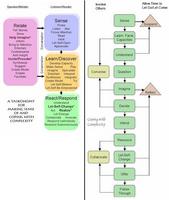| Thursday, August 16, 2007 |
| Learning to Learn |
 A post from Dave Pollard a while back. It is short, so I'll just quote the whole thing: A post from Dave Pollard a while back. It is short, so I'll just quote the whole thing: Nobel chemist and pioneer complexity expert Ilya Prigogine is cited by my friend Andrew Campbell as saying that nature has no secrets -- everything we want or need to know in the world is waiting to be discovered. That means it is waiting for us to be ready to learn it, which presupposes that we have:Very well said, Dave. Can't say it better, so I'll just say what it brings up for me. Humans have an amazing opportunity, but maybe only within a brief window of time. We can think abstractly, so we can communicate, work together and develop technology. But we're also bad at thinking abstractly, and we fail to include our own shortcomings in the equation. We have fantastic minds, but we don't have any organized body of knowledge about how they work and what we can do with them. To some degree in various self-help disciplines, but nothing that's integrated into the main things we do together. Science comes with no complementary understanding of the human mind, which is a major oversight, because science is mostly a mental activity. Groups of people perceive stuff and try to construct mental models that allow them to predict what they'll perceive in the future. That's somewhat of a ship without rudder if you don't at the same time have a concept of how you perceive, how you abstract the work into mental models, and how beliefs work. How do we learn, how do we think, what's the sub-conscious, where does intuition come from? These ought to be very central subjects, but you don't see much more than scattered studies done on one isolated piece of the puzzle or another, which makes for interesting popular science stories about various kinds of experiments and studies. But it is somewhat overlooked that WE ourselves, and our minds are an integral and central component in what we make of the world. I thought general semantics maybe could have caught on. It isn't everything, but it is at least a valiant attempt of including our mental processes in the practice of science, or politics, or anything else important we do as a society. It is rather dangerous to hand the controls of anything important to a human being who isn't aware that their thoughts are just over-simplified abstractions of reality. People who think that their two-dimensional cartoon mental pictures ARE reality have no business leading countries or operating heavy machinery. And how do we learn? That ought to be a very central question, because that's largely what we do in life, and what's what we do together. We try to figure out the best ways of doing things, and how to maximize the good things we can do while we're here. Don't we? And yet learning is mostly about occupying kids for 12 or 17 years, having them read a lot of books, and hoping they somehow get something out of that. All due respect to the teachers of the world, but it would make sense if somebody actually put together and applied the very best ways we can find of actually learning. We ought to be feeling the need already, yes. There are lots of things that aren't working well. We ought to be motivated to do better. Do we have the tools and the capacity? Not well enough. I suppose we can say that the tools would be the external levers of learning, and capacity would be the internal. We both need to organize some things in the outside world so as to facilitate learning. And we need to organize our internal world so as to actually be learning. As to both, we're somewhat in the stone age. We learn stuff, but very haphazardly. The challenge is how to effectively deal with complexity, when we mostly are using a part of our mind that is lousy at doing so. It's the old story of a human being able to pay attention to just 5-7 things at the same time. You might understand a model of a problem or situation if it has 2-3 dimensions to it, but not more. If presented with anything that has more dimensions or variables, you'd tend to default to some favorite cartoon belief that simplifies things into just a few variables. We make as if we're dealing with big, important, complex scenarios, but we do it with those minds that can only think a handful of things at a time. There's a big disconnect. I think we're actually a lot better wired than we readily think. Your sub-conscious mind deals with millions of variables quite well. Your intuition does great with complexity. You probably do have the equipment you need to operate at a much higher level. But it isn't necessarily going to work if you leave your 5-7 bit mind in charge. Paying attention, being open, imagining, yes, I'm sure that's part of the puzzle. But those are things you can't put in a test tube and measure, so we have to make some kind of quantum leap over the need to do so. We need to learn how to perceive, how to learn, how to know, how to be conscious of what we know and what we don't know. [ Knowledge | 2007-08-16 21:57 | 5 comments | PermaLink ] More > |